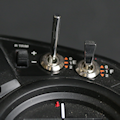Embedding Yocto-Visualization in a TypeScript WebApp
![]() A few weeks ago, we showed you how to create a small WebApp for remote control of a heater using a simple HTML file and a few dozen lines of TypeScript code, thanks to VirtualHub for Web. This week, we'll take it one step further and enhance it by adding a graph showing the history of measured temperatures.
A few weeks ago, we showed you how to create a small WebApp for remote control of a heater using a simple HTML file and a few dozen lines of TypeScript code, thanks to VirtualHub for Web. This week, we'll take it one step further and enhance it by adding a graph showing the history of measured temperatures.
| No comment yet | Read more... |
A control WebApp with VirtualHub for Web
 Yoctopuce products enable you - among other things - to remotely control a device via the Internet. What's special about the Yoctopuce solution is that it's not based on a proprietary infrastructure, which could shut down any day and render all these systems inoperable, as has already happened far too often. Yoctopuce offers remote control tools which you are free to install on the host of your choice, and which you can move to another host in a few years' time if need be...
Yoctopuce products enable you - among other things - to remotely control a device via the Internet. What's special about the Yoctopuce solution is that it's not based on a proprietary infrastructure, which could shut down any day and render all these systems inoperable, as has already happened far too often. Yoctopuce offers remote control tools which you are free to install on the host of your choice, and which you can move to another host in a few years' time if need be...
| No comment yet | Read more... |
Monitoring a solar thermal system
![]() If you've ever discussed photovoltaic solar panels with a proud owner, they will certainly have proudly shown you on their cell phone how much electricity they produce every day. With thermal solar panels, on the other hand, remote control is less widespread, as control systems are generally more primitive. So let's take a look at how you can add a simple monitoring system to your domestic water heating system, which could maybe save you a few hundred kWh a year...
If you've ever discussed photovoltaic solar panels with a proud owner, they will certainly have proudly shown you on their cell phone how much electricity they produce every day. With thermal solar panels, on the other hand, remote control is less widespread, as control systems are generally more primitive. So let's take a look at how you can add a simple monitoring system to your domestic water heating system, which could maybe save you a few hundred kWh a year...
| No comment yet | Read more... |
Switching the Home Assistant extension to Async
 A few weeks ago, we announced our new Typed Python programming library, which offers an asynchronous API in addition to the "traditional" one. This week, we'll take a look at how to use these asynchronous functions by updating the Home Assistant integration we described in this post.
A few weeks ago, we announced our new Typed Python programming library, which offers an asynchronous API in addition to the "traditional" one. This week, we'll take a look at how to use these asynchronous functions by updating the Home Assistant integration we described in this post.
| No comment yet | Read more... |
Controlling a relay from Home Assistant
 Some time ago, we looked at how to build a smart extension cord and how to use it to monitor the consumption of an electrical appliance with Home Assistant. We're going to enhance this Home Assistant integration by adding the ability to switch this extension cord from Home Assistant.
Some time ago, we looked at how to build a smart extension cord and how to use it to monitor the consumption of an electrical appliance with Home Assistant. We're going to enhance this Home Assistant integration by adding the ability to switch this extension cord from Home Assistant.
| No comment yet | Read more... |


